Glasgow's Miles Worse - Not Miles Better!
The Scotsman wonders if the filthy state of Glasgow's streets and public spaces will be a key issue in the city's local elections in May 2022.
I suspect the answer to this question is likely to be 'Yes' because Glasgow has become something of a laughing stock ever since the council's SNP leader suggested that all the city needs is a wee spruce up.

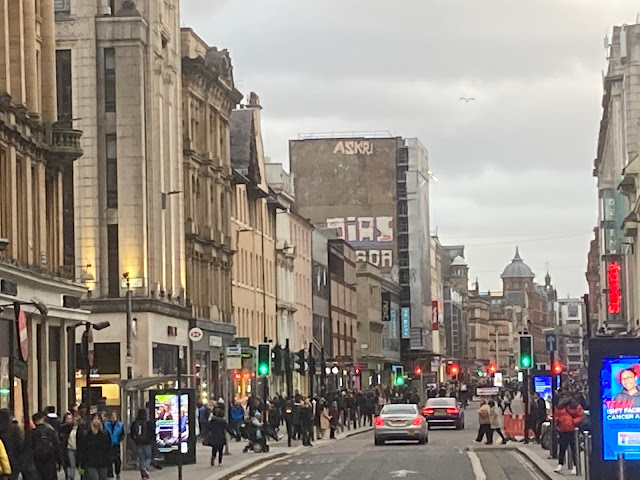

Council elections: Could Glasgow's rubbish problem be the tipping point for voters?
Local elections in Scotland’s biggest city could hang on the state of its streets.
By Ilona Amos - The Scotsman
Glasgow came under worldwide scrutiny last year, when it was host city for the United Nations climate summit COP26.
As many as 300,000 people, including world leaders, international delegates, press and visitors, came to the city for the conference and all its sideshows – the biggest event of its kind ever staged on UK soil.
The Scottish and UK governments and Glasgow City Council spent months preparing for the two-week meeting, primping, preening and tarting the place up in readiness for the hordes.
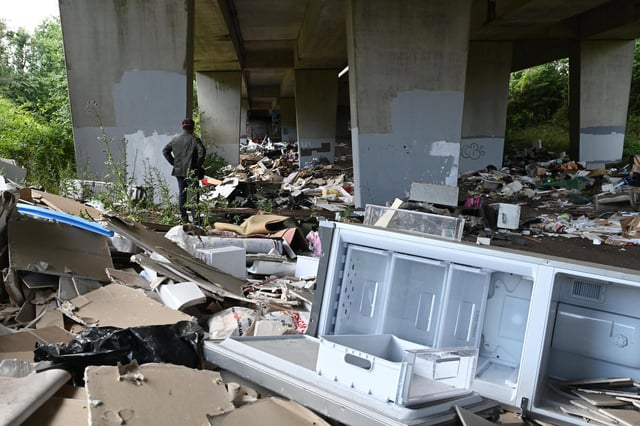
Parts of Glasgow are afflicted by fly-tipping on an industrial scale -- as seen at this privately owned site under the M8 motorway flyover at Blochairn, which was cleaned up ahead of the COP26 climate summit. Picture: John Devlin
But an ongoing problem with rubbish saw it painted as the UK’s “fly-tipping capital” and riddled with vermin.
And the issue continues to cause anger among local residents and businesses.
Glasgow came under worldwide scrutiny last year, when it was host city for the United Nations climate summit COP26.
As many as 300,000 people, including world leaders, international delegates, press and visitors, came to the city for the conference and all its sideshows – the biggest event of its kind ever staged on UK soil.
The Scottish and UK governments and Glasgow City Council spent months preparing for the two-week meeting, primping, preening and tarting the place up in readiness for the hordes.

Parts of Glasgow are afflicted by fly-tipping on an industrial scale -- as seen at this privately owned site under the M8 motorway flyover at Blochairn, which was cleaned up ahead of the COP26 climate summit. Picture: John Devlin
But an ongoing problem with rubbish saw it painted as the UK’s “fly-tipping capital” and riddled with vermin.
And the issue continues to cause anger among local residents and businesses.

Read MoreShocking footage of rotting waste at illegal Glasgow dump site as fly-tipping br...
There is a sense of “decay, entropy and hopelessness”, according to one city centre shopkeeper.
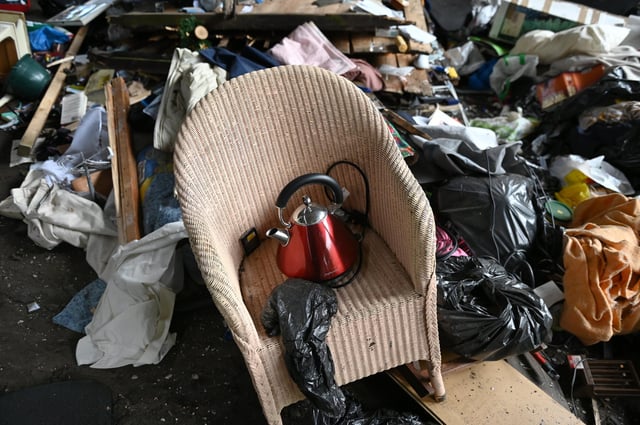
Baths, asbestos, washing machines, fridges and huge piles of domestic rubbish were illegally dumped under the M8 in the east end of Glasgow last year. Picture: John Devlin
Samantha Cooper owns 23 Enigma on High Street, the city’s oldest medieval thoroughfare.
She is also organiser for Glasgow High Street Merchants Association.
She describes the council’s upkeep of the city as “managed decline”.
“Glasgow is aflame with people’s passion about the filth,” she said.
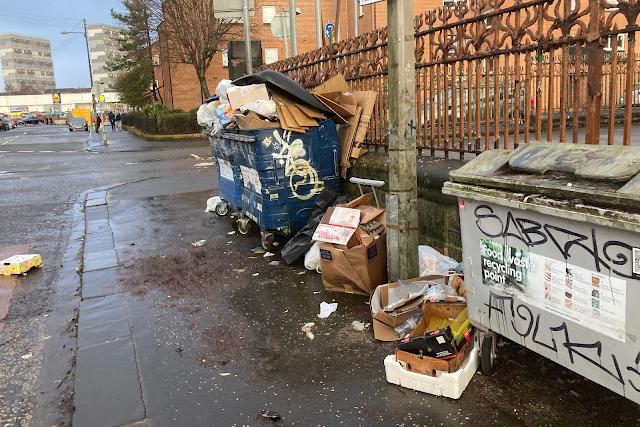
This picture was taken recently in Napiershall Street in the Kelvinside area of Glasgow. Picture: Mark Irvine
“High Street is Glasgow’s equivalent of Edinburgh’s Royal Mile.
“It’s a lovely winding, historical street, leading to the cathedral.
“Visitors come here from all over the world to connect with the heritage.
“And when they get here they're tramping through filth.
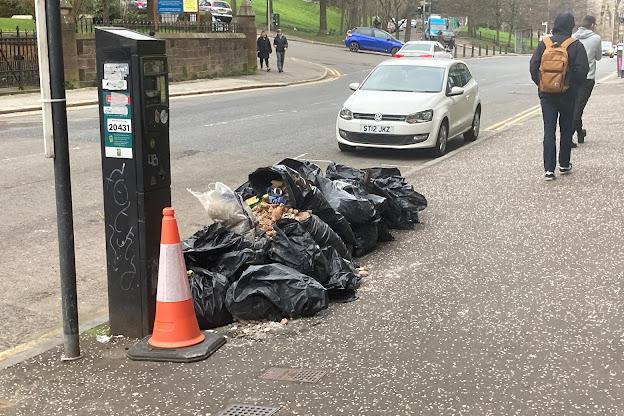
It's thought a whole range of factors are driving Glasgow's rubbish problems, including budget cuts, waste disposal charges and the Covid-19 pandemic. Picture: Mark Irvine
“Bin bags lie piled up in the street for over a week.
“It really affects the well-being of residents.
“But it’s not just local Glaswegians and Scots, this impression of Glasgow is reaching the world.
“Tourists come here to the ancient heart of the city and comment on the mess.
“All you can see is decay and rubbish.
“Just months after COP26, there are shops lying vacant and rotting with filth on their doorsteps.
“It feels like the summit was just an enormous greenwash and the ethos has not fed through.
“There is too much talk and no action.
“High street is like a microcosm – it reveals the rot and decay encompassing the whole of Glasgow.”
Mark Irvine, an independent blogger, campaigner and former trade union official who lives in the city centre, is also critical of failures to keep neighbourhoods clean.
“Glasgow has become a laughing stock since the council leader, Susan Aitken, suggested all the city needed was a little ‘spruce-up’ ahead of COP26,” he said.
“In truth, Glasgow has become a bit of a midden and the city is now unkempt and filthy, as it was back in the 1970s.
“What's needed is a real change in attitude, a big clean-up and a properly resourced, council-led campaign which engages with local people to turn things around.
“Because graffiti, street cleaning, litter and fly-tipping are issues right across the city – not just in a few local hotspots.”
Thomas Kerr is a councillor for Shettleston in the east end of Glasgow, one of the regions most badly blighted by rubbish.
He believes the situation has got to its current crisis level through a combination of several factors.
The Covid-19 pandemic saw most people staying at home and ordering packaged goods online, sparking a massive increase in domestic waste.
At the same time the council brought in a £35 charge for uplifting bulky items such as furniture, with extra levies for electrical goods.
Bin collections were also reduced from fortnightly to every three weeks.
Meanwhile, municipal tips were closed and the number of street cleaners has been cut.
And now the dramatically rising cost of living and rocketing energy bills is making things worse.
Many people are struggling to make ends meet, and he thinks people who are unable to pay the council charges and have no room to store unwanted items are resorting to cheap private removal services who are not always properly disposing of the refuse.
“It’s a big, big issue,” he said.
“There have been years of cuts to council budgets.
“Working class households can’t afford bulk uplift charges.
“It was free for years in Glasgow and then the charges were brought in right in the middle of the pandemic.
“If you’re a single parent with three children living in a small home, you’re going to look for cheaper alternatives.
“The city looks tired and rundown.
“There was a slogan – Glasgow’s Miles better – I don’t think anyone here would think that holds true any more.”
Fly-tipping is a major problem in Glasgow as it is across the country, with industrial-scale illegal dumping linked to organised crime gangs.
A total of 48,539 incidents were reported over a two-year period in the city.
Last September the council rolled out a special ‘environmental crime scene’ approach for dealing with the problem at black spot locations.
From January 2020 to March 2021, more than 8,500 calls were made to the council's pest control services in response to rats.
Environment and anti-litter charity Keep Scotland Beautiful is working to support clean-up efforts by the council and communities in Glasgow as part of its Spring Clean Scotland campaign, which kicks off today.
Chief executive Barry Fisher said: “There is no point pretending that Glasgow, like other great cities across the UK, doesn’t have litter and waste issues.
“There are real challenges.”
But he believes citizens and authorities can work together to tackle the issue with “renewed vigour”.
“Our call out is simple,” he said.
“To those who are proud of the country we live in and are frustrated – join us to help combat the problem and pledge your support to clean up this spring.
“To those who haven’t worked it out yet – use a bin, take it home but don’t leave it behind.
“We all need to play our part and change our behaviour, and we are offering support to community groups across the city to take action to tackle litter at a local level, turning anger into action.”
A Glasgow SNP group spokesperson said: “Glasgow, in common with other cities, has experienced a significant increase in environmental crime during the pandemic alongside other severe impacts on the city economy, communities and public services. That’s why the SNP administration is working with partners in communities and business to focus on a recovery that prioritises resilient public services, tackling the climate emergency, creating a healthier city, and supporting our communities.“The investments we’ve made in cleansing staff and infrastructure throughout our term in office give us a strong foundation for recovery, with our most recent budget investing even more in environmental enforcement, new permanent neighbourhood teams, and £1m for every one of Glasgow’s 23 wards, which communities will be able to direct towards their local priorities. Service reforms to address Glasgow’s historically low recycling rates are starting to bear fruit, with recycling now rising across the city.
"Glasgow city centre has been hit harder by the pandemic than any other in the UK outside London. Our City Centre Taskforce has brought together public sector and business partners to create an action plan for recovery and build on pre-pandemic achievements like the High Street Strategy, the first specific plan ever developed for Glasgow’s long-neglected medieval heart.”
A city council spokesperson added: ”The council’s cleansing budget for Glasgow has risen by more than 20% since 2015, and this very real commitment to keeping the city’s streets clean can be seen in the investment in household bin services (£10million), new street bins (£6million), 20 new mechanical street sweepers, as well as other vehicles and actions to increase recycling and improve the environment for everyone in the city. All of this underlines how serious we are about making the city’s streets cleaner.”
GLASGOW
Most voted party 2017: SNP
Current control: SNP minority
Leader: Susan Aitken
Number of elected councillors: 85
Number of electoral wards: 23
Key issues: Waste collection/litter, transport, LEZ, strikes, Glasgow Life, facility closures, rental costs, events planning


